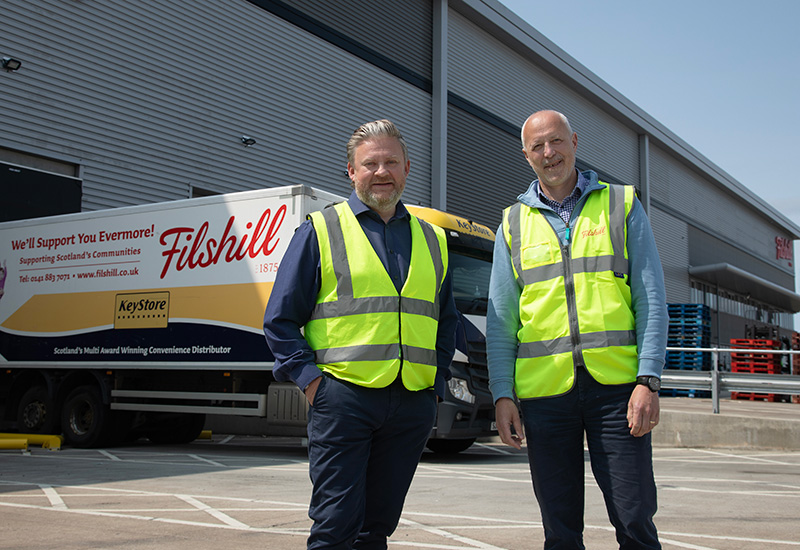
Strong financial results reported by JW Filshill
Scottish wholesaler JW Filshill saw turnover increase to £215m – up 6% – from £203m in the year ending 31 January 2024
Ahead of marking its 150th anniversary in 2025, the fifth-generation business saw operating profit during the year ending 31 January 2024 jump from £2.9m to £4.2m, gross profits from £19.4m to £22.3m and net assets from £18.9m to £21.6m as it continued to deliver against its corporate strategy and ambitions for the future.
Keith Geddes, chief financial and operating officer, said improved growth and profitability was “particularly impressive” given that it relocated from its previous headquarters at Hillington to its purpose-built site in Renfrew during the period.
“The massive effort put in by all Filshill employees and the support we received from suppliers and customers was much appreciated,” he said. “The new facility is a major step forward in delivering our planned growth and business improvements, allowing us to push forward in achieving the ambitious targets we have set for ourselves over the short, medium, and long term.
“The investment in the new facility and other projects throughout the period has taken the level of investment in the future of the business to £6.6m over the last two years and demonstrates the commitment and confidence we have in our future.”
Geddes added: “Operational efficiency generated from the new distribution centre has not only created significant benefits to the company and customers in terms of operational process but also in improved safety, and has led to additional capacity being generated which has allowed us to seek out new opportunities with our suppliers and customers. Our product availability to our customers is industry leading as a result.”
The company, he noted, continued to ramp up investment in technology and “in particular in the innovative use of data”, adding: “We created a standalone data and reporting team including the recruitment of an experienced data manager and data programmer to supplement the analyst capability already in the business. All departments and areas of the Filshill business are encouraged to identify opportunities where data, machine learning and AI could be used to improve our business and help deliver improvement and success to the company, customers and suppliers alike.”
However, the group pointed to ongoing inflation and increases in the cost of living, with increases in the cost of fuel and food and drink causing “uncertainty for the group, our staff, our customers and suppliers”.
During the period, Filshill also continued to develop its strategy around reducing its carbon footprint, identifying areas where it can positively influence a reduction in its carbon impact and work towards a net-zero emissions position.
Geddes commented: “The move to our new Westway site enabled a step change in our carbon footprint through the modern design and build quality – in particular insulation, improved natural lighting, energy-efficient artificial lighting, and reduced heating requirements along with significant solar power generation.
“We have been able to end the use of gas completely following the move. All internal warehouse equipment is now electric rather than diesel or gas, and trials are under way to understand the impact of using HVO fuels to replace diesel for our transport fleet in terms of maintenance and cost implications. We also now have two fully electric rigid 19t lorries in live use and are building a working knowledge of how best these can be used to minimise diesel use.”
He added that the company measures C02 usage in grammes per case delivered and “we are pleased to report that this has declined by 14% in the past year”.
Simon Hannah, group chief executive officer, said Filshill’s engagement with its workforce on health, mental health and wellbeing remained key to its activities, with financial planning given the cost-of-living crisis, suicide prevention, and healthy eating all featuring in regular support sessions.
“A number of new mental health first aiders have been added to our team but there has also been refresher training for those trained in previous years to maintain the high level of support available to the full team and to our Keystore partners,” Mr Hannah noted. “The company currently has over 30 fully trained mental health first aiders.
“Engagement with charities and local support organisations around our Westway site but also in individual Keystore customers’ neighbourhoods is targeted at areas identified through feedback sessions with staff and customers to maximise the support we give the Filshill team and maximise our engagement with the local community. We are proud of our contribution to supporting our community.”
He added: “Driving our safety-first culture remains a cornerstone of everything we do. This has been particularly important as the relocation of our distribution centre required all operational and support functions to be assessed and new safe working practices defined and trained out. Our workforce retention and ability to recruit has been positively impacted by these initiatives.”
carbon emissions data finance health and wellbeing JW Filshill Keith Geddes Simon Hannah sustainability